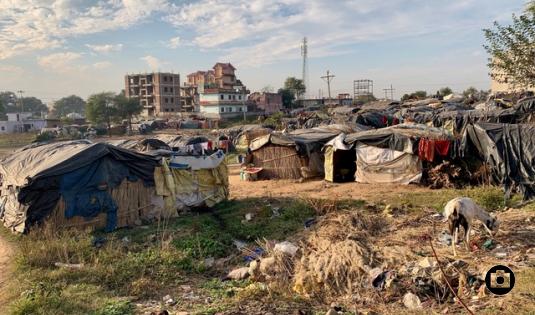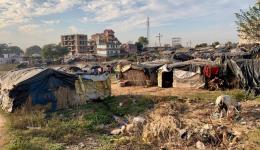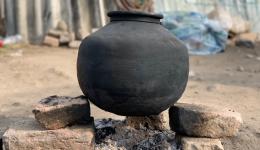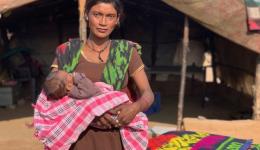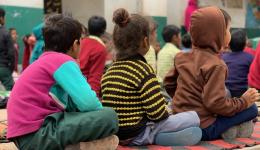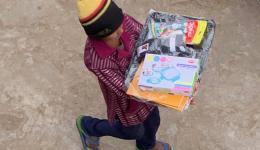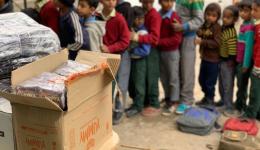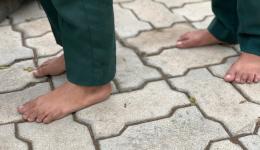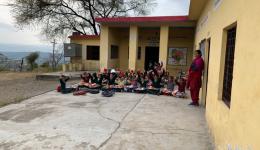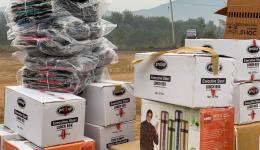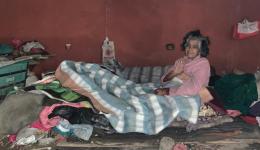Registered Nonprofit
Association for the Support
of Children and Needy
People Around the World
Unterstützung
Work in slums, medical hardships, distribution of blankets and caps in winter
Sat, Dec. 21st., 2019 - 09:40am, written by Alexandra, published by Frank
A little bit of "Star Money" for everyone...
In the cold night our cars drive to the underpasses, dark corners and places where people are lying.
Bodies stretched out on thin surfaces: newspapers, cardboard, textiles. Covered with mostly equally thin bedspreads.
It feels like it was yesterday that someone read us stories intended to convey values. These were only fairy tales, not real-life stories, and although we are actually confronted with the hard facts of life, these stories from childhood are sneaking into our minds. Or maybe just because of that?
The fairy tale of the Star-Money...
A child who gives away his coat, shoes, shirt and his last piece of bread, only to receive the stars that rain down on him as thalers. A fairy tale, so beautiful and almost sarcastic when we see the harsh world in which people live.
Tonight we will not "do someone a favour", we will not "help" anyone. We will not relieve any need and we will not take away the loneliness of anyone we meet. In these hours we will watch in silence and secrecy how it gets brighter around us...
Sunny shakes a man: "Baba, blanket!" bluntly, not euphemistically: "Father, blanket!" Drowsy eyes peer out from under a thin cloth. A star falls.
The old man sits up, folds his hands, nods his head graciously and slips under the warm woollen blanket.
Brijesh, Vijay and Subodh climb a wall, hand blankets over the fence to some mothers. And knitted caps for the children who lie under a tarpaulin. Another star falls.
A man in a wheel chair and ragged clothes is moving towards us. Two blankets and a wide scarf with warm meshes envelop him after a brief greeting.
Loud crying can be heard in the night and in English the man can say: "I am happy." As he drives on, he sings an old Indian song that says: "May you live fifty years and one more, and then another 50 years shall begin".
The amount of blankets and homemade scarves and caps from our knitting ladies inside our vehicles is decreasing. But the space is now taken up by the thalers, which have fallen not only on the many places we drove to, but directly into the open windows of our cars.
It gets light and warm, they tell us something about the sky, although we did not want to give presents to ourselves but to others.
Mon, Dec. 16, 2019 - 6:45pm, written by Alexandra, published by Frank
A blanket and a light in the night...
There is an old couple lying under a dusty, dark grey plastic tarpaulin. Sunny takes an end and pulls the rustling cover off the people lying on planks. He wraps them in warm blankets and puts two more on their laps. The faces are rigid, the man coughs loudly. The woman kisses Alexandra on the cheeks. Last week the man had told us that he could earn some money with a bicycle rickshaw. Sunny tells him that we ordered one for him this morning! The man is crying...for joy
A light shines next to the place, in front of a tree. Some figures of deities stand beside it.
A mental change of scene:
How would Jesus Christ think or act in a similar situation? Would he consider:
"If they are Christians, then we will give them the blankets" or
"We'll ask them if they'd like to convert to Christianity."
"Why are they lying here? Didn't the man find a job before because he might not have made enough efforts?"
When we go to a church or other "special place," many people are respectful. Being able to orient oneself to something "higher" is helpful in many situations of life.
That night we look for people who are lonely, crouching under a small blanket or plastic bag.Their radiance is sweet and soft when Sunny puts the blanket around them, although their faces reflect the hardships of heir lives.
"It's time," a voice says, "to give love its due space and not allow differences, but to light more lights."
Sat, Dec. 14, 2019 - 10:23am, written by Alexandra, published by Frank
A pencil, two apples...
The schoolchildren in the remote areas that our friends help friends team has visited in the past few days differ little from children in other countries AT FIRST SIGHT. With properly trimmed hair and washed clothes, hundreds of children of different ages look at us curiously with big eyes.
When we drive on the bumpy mountain roads and steep slopes to get to the remote places, one seems to feel the "tension" of the children in advance.
Even though it is cold with the wind whistling around one's ears, the little ones sit outside in front of the barren school walls on woven cotton carpets, a few meters long, 50 centimeters wide, neatly cross-legged one behind the other.
"Good morning!" a choir of children's voices sounds unanimously, all with folded hands. The only words that can be heard in English in the following hours of the day.
Everything that was transported in the pick-ups and cars is then spread out on a large table: School backpacks, crayons, exercise books, snack tins, warming bottles, fruit, biscuits and socks.
The feet without socks, the stockings that have holes, the shirt that is far too small or far too big, the sweater or the cardigan that has already been mended many times, the ripped trousers, the many snuff-noses and the unmistakable cough from small mouths - these are the things that one perceives AT SECOND SIGHT.
A teacher tells us that most of his students come from particularly poor backgrounds and that many parents are not in a position to simply buy a new sweater for their child. He himself travels by bus for half an hour every day to a certain stop, then he walks the rest of the way - six kilometres one way.
School lasts from nine in the morning until about three in the afternoon. Two women cook lunch for the children and the teachers, paid for by the government. This is an incentive for the families to send their children to school regularly. One "eater" less at home saves some of the supplies.
As in Germany and many other countries, it is no longer allowed in India to publish photos of children whhich fully reveal their identity.This is the reason why we will not be able to show so many pretty photos of beautiful smiles and joy in the future. Of course, this is to protect the little ones, therefore we will comply with these regulations. In the lectures, which are given by friends help friends at smaller meetings with friends, we will of course continue to show the beautiful "snapshots", which we do not want to withhold from you ;-))
Back to the headline:
It had been probably similar in our countries 70 years ago: What did we get e.g. on our birthday? Mostly something practical that we could use or eat right away.
The joy and enthusiasm about such "useful" gifts also seems comparable to what it was then.
Carefully a girl takes the grey socks out of the pack, strokes them with her fingers and gently puts them back. Two about 8 year old girls excitedly chat and compare the pictures on their snack tin.
They are attentively turning the pages of the simple, lined notebooks.
The biscuit packs are usually immediately opened to enjoy the first biscuit...
Wed, Dec. 11, 2019 - 9:30pm, written by Alexandra, published by Frank
"Guilt " or "innocence"... Thoughts FROM another world ABOUT another world
"...yesterday everything was different. Yesterday I sat with a neighbour on the bench in front of the old house and looked into the flower garden.
My neighbour helped me when I needed him and I helped him care for his bedridden mother.
Children ran down the street laughing. The last rays of sun shimmered between the branches of the little apple tree so carefully cared for by grandfather.
While I scratched a piece of flaking paint from the bench every now and then, my neighbour reported on the village dance. The day before yesterday the big event took place for which everyone had waited a long time.
For weeks during the harvest of the wheat we will still tell you about it and sometimes dream unnoticed of dancing on between the tied ears of corn with our eyes closed.
If the radio in the kitchen should ever play again what we both especially loved, namely "Ramona" by the Blue Diamonds, then we would meet secretly in the kitchen. Everyone with their own dreams pretending that this feeling would stay forever..."
Memories of a bygone time and yet more up-to-date than ever...
"What is TIME doing with us?" Or maybe we should ask "What is it that we are doing with TIME?"
In the past few days our Friends help friends team was out and about in poor neighbourhoods visiting people whose fate is such that the available choice of possibilities does not affect the time factor.
Hopelessness; pain, that hearing and seeing go away; worry, to be able to stuff the hungry mouths, so that one's own bite gets stuck in the throat;
To speak of exaggeration in the face of the last lines would in fact not be a possibility, since it would be devoid of any objective observation.
Like a cloud of compassion that unites all those who sit, stand, watch helplessly, one or the other encounter may be described.
Like the one with that mother who fell into the fire a few months ago and suffered violent burns on the right side of her body, the destruction of one eye and her outward beauty.
One of our team doctors immediately took her to a hospital to avoid the worst effects.
Three months later we visit her again. When she sees Alexandra, she immediately begins to cry bitterly. Happened what had to happen. Her husband, himself a victim of life-long poverty, took the two big boys of the family with her and went out of her way. Three little girls stayed with her and the hut, a few square meters in size. Clay on the floor, plastic tarpaulins on the roof. As if it were something precious, she points to the stretched mosquito net at the back of the room, which we had given to her and all the other people in several slums in August of this year.
One of our friends brings two large stainless steel jugs, puts them next to the mother. Water must be brought from a nearby tank. A little boy fills the water from the shabby plastic canisters, where small plastic particles stand up due to wear, into the new containers.
Today we went to about eight poor quarters to distribute blankets, scarves, caps and, if necessary, large quantities of containers with small trucks.
We don't look at the clock and take the time to talk to the people. Nevertheless we work quickly, because we know that the more we manage to work, the more people freeze less tonight than yesterday...
Yesterday was yesterday and today is today. And now only this moment, this place and these four people count. It is not an imaginary philosophy of some "do-gooder", as we are sometimes called by people to calm their own conscience.
A not so small number of people look sadly at someone in their midst, whose suffering is even more indescribable than their own.
The world prefers to see everything in black-and-white. The question of guilt is one of the most frequently asked questions...-.... does it make sense?
If we wanted to find the culprit, we would surely find one or even more. The husband; the neighbours who could help more; culture and society; the government...
The question of guilt makes us search for the one who is difficult to discover and if so, then a comparison might make us realize that this is not the point at all.
In "Walden" by Henry David Thoreau he speaks of an unnoticed "harmony inaudible to man" with regard to the "real interaction" of humans.
Even if it is sometimes difficult for us as well to recognize which gifts we have already received from life, a place like this can allow us to see things in a new light...
In the few small bowls next to the stove there is almost nothing to eat - some Indian friends bring two big sacks of varied food.
A small, circular spot on her arm is still wetting - a doctor friend comes, takes care of the wound, hands over a supply of medicine and explains the exact use and intake to the mother and the neighbours.
The children are cold - warm hats and scarves from our knitting ladies are lovingly put on them and around their necks...
Tue, Dec. 3rd, 2019 - 9:30pm, written by Alexandra, published by Frank
The ART of living or still life of a somewhat different kind...
Man likes to arrange things in an elegant way in order to transform them into something more beautiful.
The question comes up: What is beauty?
Lies beauty after all in the eye of the beholder?
One often seems to agree on what is to be called "beautiful" or "less beautiful", even if there may be different opinions about it.
Has anyone ever succeeded in grasping beauty in its entirety?
When Alexandra walks through the slums with her friends, curiosity is a door opener to what may never have been seen before. Every step into the unknown hidden behind an invisible "border" is connected to something previously unseen. A small cosmos of its own opens up before you, into which you are only able to enter if you remove the protective skin around you which separates people from each other for external reasons.
We see a broom. Neatly bound together by hand, by someone who has probably done this most of his life. By the time it came in the hands of the boy who is now using it, it probably was a long journey. From the branches of a tree to the one who collected the usable parts, then tied them to the usable piece, then finally sold it to a merchant to provide the daily bread for his family.
Then to the street vendor, most probably someone who sat for many hours on a dusty sidewalk waiting for somebody to buy the broom.
When Sunny and Alexandra enter the slum, a boy holds this broom in his hand. He diligently uses it to scrape away the excrements of two cows opposite him, along with some water from a bucket, and clean them. When he's finished, the cows will have a cleaner place here again.
You have to take off the glasses that, through their smoky film, keep you from seeing the dignity and grace hidden in this act. Real beauty can often only be recognized at second glance.
We see a tower of bags made of net fabric, in which carefully sorted bottles are packed. How many hands have worked to produce this beautiful picture? How many hands have grown in this work over the years of their youth until they got wrinkles? How many hands were stung, cracked, cut by broken pieces? How many hands were wounded and healed? How many owners of such hands continue creating still lifes of this special kind every day?
This is more than just "ordinary" art. It is the art of surviving by creating artworks of a beauty which is still largely unrecognized...
